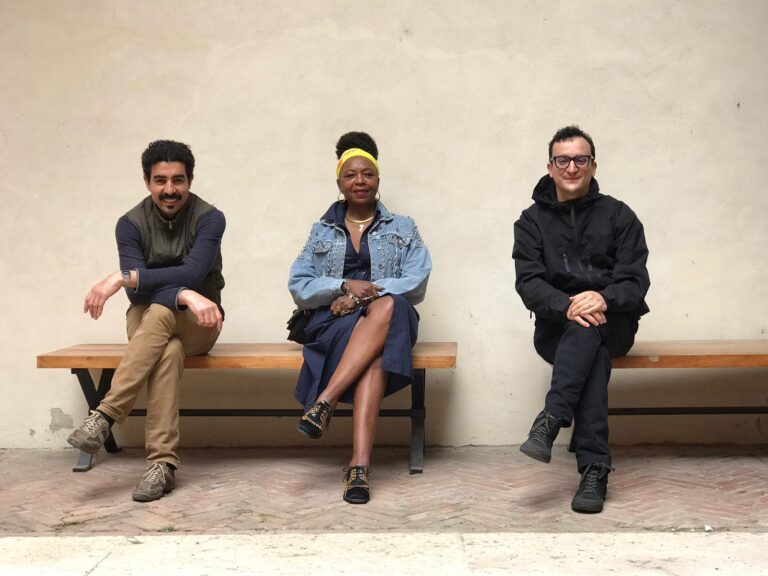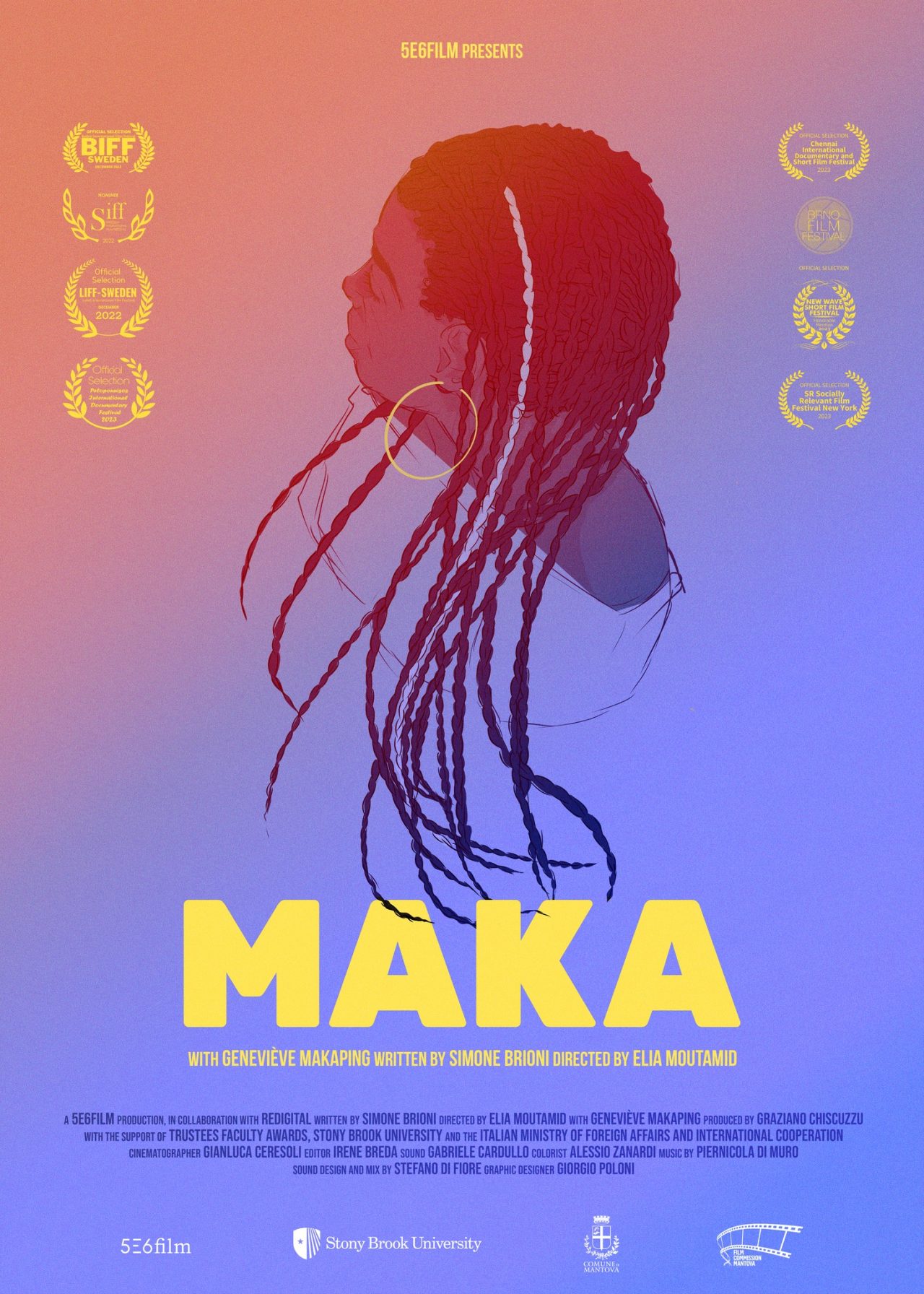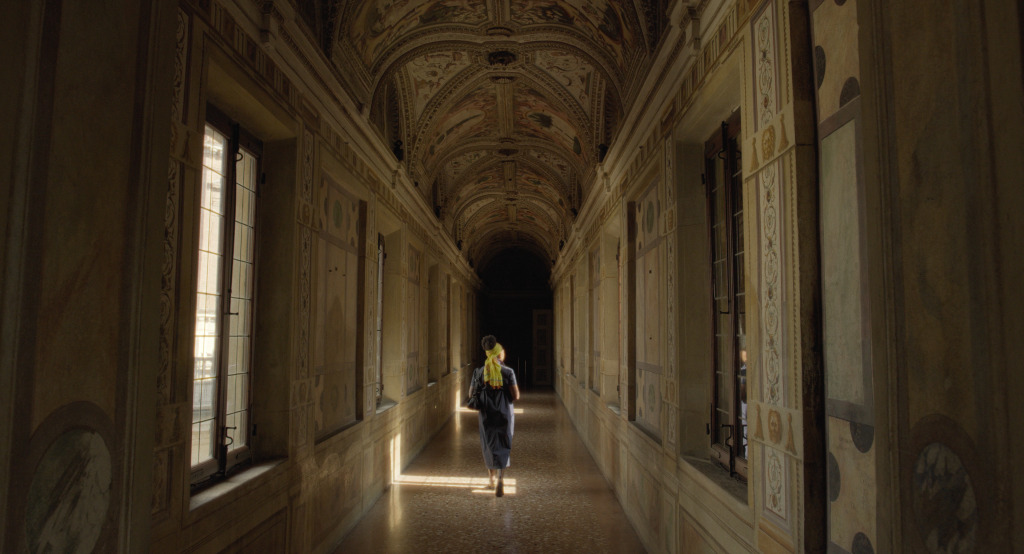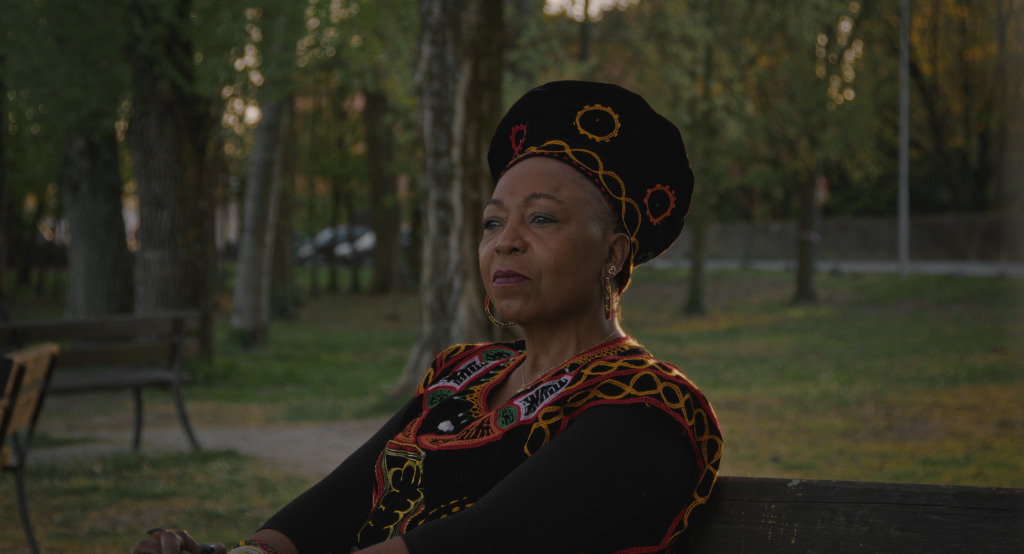
Filmmaker Elia Moutamid — whose previous works as director include Gaiwan (2015), Talien (2015 and winner of the “Special Jury Prize” at the Turin Film Festival 2017), Kufid (2020) — has released his latest film: Maka. This film is the result of a heartfelt collaboration with Simone Brioni, writer and Assistant Professor at the Department of English at Stony Brook University. The scholar’s research specialises in the literary and cinematographic representation and self-representation of migrants. Therefore joining forces with the filmmaker specialised in exploring multiculturalism, was a match made in heaven.
The documentary retraces the personal history and social impact of Geneviève Makaping, a Cameroonian-Italian anthropologist and writer who was the first Black woman to be named the director of a newspaper in Italy (La provincia cosentina, 2004-2007) and was also the first Black anchorwoman in the boot-shaped land (Metrosat, 2004-2010). The picture offers a detailed account of Makaping’s journey of migration from Africa to Italy during the Eighties, the tragic death of her partner, her success as a journalist in Calabria, and her current teaching job in Mantua. Geneviève Makaping is the author of the book Reversing the Gaze: What if You Were the Other? that inspired this film and is the first case to have gained Italian citizenship by merit and not through marriage.
In this Exclusive Interview Elia Moutamid and Simone Brioni explain how Maka starts as a personal story and expands to a wider investigation into the perception of migration, race and what it means to be ‘other.’

Q: The film begins with a quote from Virgil’s Aeneid and is followed by another one from the Quran. They both epitomise the film’s theme of interculturality. How does this concept resonate with your personal story and your artistic approach?
E.M.: I see these two quotes as an example of the incredible synergy that Simone and I have found by making this film together. He came up with the quote from Virgil’s Aeneid in which Aeneas blames the people of Salento, Italy, for not welcoming Trojan refugees. By starting with the Aeneid, Maka emphasises that the topics of immigration and refugee rights are enduring issues with a history spanning centuries. Given Virgil’s status as one of Mantua’s distinguished historical figures, perhaps his insights on migration should serve as a reminder in the contemporary context. I added a quotation from the Quran, which invites people to work together, regardless of their different backgrounds. The combination of these quotes aims to rethink the historical symbols of Mantua in light of Italy’s multilingual and multicultural present. They introduce one of the topics of the documentary — hospitality towards foreigners — by referencing my multiple belongings as a Northern Italian Muslim man.
Q: How did you and Simone Brioni bring to life this film — funded by Stony Brook University — and how was it to venture into the field of academic filmmaking?
E.M.: The collaboration with Simone has been very stimulating for both of us. Simone admired my previous films Talien (2017) and Kufid (2021), and he wrote a thorough analysis of Talien. I found the content of the previous films he made with Graziano Chiscuzzu and Ermanno Guida, The Fourth Road and Aulò (2012), very original and interesting because I had never seen before documentaries about African Italian intellectuals. Graziano was also the producer of my previous films and he put us in contact. Maka is the result of these previous experiences, but it is also a new form of expression involving a collaboration between academia and the film industry, which aims at reaching audiences both within and beyond academia in Italy and in the US. Throughout the making of the film, we had a fruitful exchange about how questions about race and racism are addressed in Italy and in the US, and we learned from the debate generated by the Black Lives Matter movement in both countries. I am excited to present the film to a new audience of students and scholars in the forthcoming tour of Maka across the US. I look forward to learning from their questions and their reactions.
Q: Maka very well addresses the demarcation between the North and South of Italy. Geneviève finds a poetic way to connect the Northern “polentoni” to food [Polenta is a Northern-dish of boiled cornmeal] and the Southern “terroni” to the earth [Terra in Italian means earth and the term makes a reference to peasants working the land]. You have Moroccan origins and grew up in Northern Italy, therefore the topic must resonate with you strongly.
How meaningful was it for you to be both behind and in front of the camera in this film?
E.M.: It was not the first time for me to appear in the films I direct. However, Maka is a radically different from my prior documentaries. This is because it doesn’t follow the autobiographical format. Of course, I appear in the film in my role as a director and speak about some themes that hold personal significance to me. However, in Maka, my voice conveys the reflections that Simone has developed in his research on collaborative practices, migration and representation, racism, and translation. Geneviève Makaping’s story resonates with the story of my parents, as they came to Italy when she arrived. In the 1980s they found people who were very curious about their stories and the countries where they came from, and it is sad to note how frequently racist acts in Italy are condoned today. Learning about Makaping’s story was a way for me to question the history of migration that also affected my parents.
Q: There’s a beautiful scene set in Mantua’s Palazzo Ducale that gives voice to some African figures of the Renaissance depicted by Andrea Mantegna. From that era to the present, what are the major changes that strike you in the way Western culture has processed colonial ethnography?
S.B.: This scene illustrates the existence of migration, including forced migration in Mantua during the Renaissance. It shows that another significant era in Mantua’s history, identity, and urban landscape had references to and depictions of Africans. By scrutinising the presence of Africans in Renaissance art, Maka endeavours to challenge a whitewashed portrayal of Italian history. While the Renaissance is typically perceived as a period characterised by humanism, personal freedom, and individual expression, it also marks the emergence of colonial fantasies. While I was writing Maka, I made another documentary with Matteo Sandrini and Ubah Cristina Ali Farah, Beyond the Frame, about the long-lasting legacy of colonial photography in our present. The two films can be seen in dialogue with each other: the former shows how Makaping talks back to the universal idea of subjectivity or national spirit, heritage, or home, while the latter explores the white sight, which colonial photography was imposed on colonised people. Today, several artists and writers, including Makaping, are reflecting on how different systems of inequality based on gender identity, class, race, sexual orientation, ethnicity, disability, age, and other forms of discrimination often operate together. This is a major change from the past.

Q: We’ve switched from racial discrimination to a type of inclusivity that often entails cancel culture. What are your thoughts on censoring literature and films portraying historical circumstances that were inhumane towards certain ethnic groups?
S.B.: I am not sure I can see this “switch”. It seems to me that migrant writers continue to face difficulties in being published and having their voices being heard. This is the reason why I have devoted the past six years to working on this film. As Makaping argues in her book, Reversing the Gaze (2023), racism in Italy is structural. The World Upside Down by general Roberto Vannacci has reached number one on Amazon Italy’s bestsellers list, although it includes homophobic and racist remarks. Italy is currently being led by individuals who hold deep admiration for Mussolini, eight decades after his regime’s downfall. Literature and films that challenge a predominantly white and male-dominated narration of history are also facing bans across the United States at a concerning frequency. In a newly published report from the advocacy organisation PEN America, which monitors book censorship, it has been revealed that the 2022-23 school year witnessed an unprecedented 3,362 instances of banned books, impacting access to a total of 1,557 distinct literary works. These bans are predominantly instigated by conservative groups. Books written by migrants are much-needed invitations to un-think ethnocentrism and to deconstruct fixed or binary notions of identity. The fact that this literature refers to minority’s life experience does not mean that it addresses only a niche readership or is limited in its scope; rather, it shows readers the complexity and diversity of the human experience.
Q: Geneviève Makaping stresses the importance of words being like stones. How important do you think language is for the marginalised?
S.B.: According to Audre Lorde’s The Master’s Tools Will Never Dismantle the Master’s House a work on language is key in determining the ways in which readers perceive and categorise experience. Gloria Anzaldùa’s Borderlands/La Frontera materialises the crossroads where different cultures, languages, and identities converge by mixing “Spanish and English, and a sprinkling of native words.” As Makaping shows in Reversing the Gaze, language is not neutral; it is imbued with power and reflects the dominant cultural and social values of a society. The creation of new and cross-cultural forms of knowledge is strictly tied to the ways in which such ideas are expressed. Linguistic hybridity is key to criticise the nationalist myth of one nation, one language, one culture and to show that, as Edward Said noted, “partly because of empire, all cultures are involved in one another; none is single and pure, all are hybrid, heterogeneous, extraordinarily differentiated, and non-monolithic.”

Q: Has your encounter with Geneviève Makaping changed your perception of others or how they gaze at you?
S.B.: The inspiration to include the meta-cinematic reflections of an authorial voice came from reading Reversing the Gaze and talking to Makaping. As a white, cisgender, heterosexual, University professor, I could not write a film about a Black woman without thinking about the violence implied in the act of filmmaking, especially because we aimed at reflecting upon the importance of self-representation, and how race and gender relations have traditionally been represented.
E.M.: I have always considered myself a Moroccan, an Arab and a Muslim. I grew up in Northern Italy, in Brescia, enjoying the privilege of my light skin pigmentation. When I met Maka, she reminded me that Morocco is part of Africa. For the first time in my life, I had to reconcile with my African side: besides being Italian, Bresciano, Moroccan, and Arab, I am African, too. I would like to explore more in my future work how the perception of our selves is modified by considering these multiple belongings.
Q: How do you hope Maka will impact audiences and where can they see it?
S.B.: The film premiered in Italy at the Milan’s African, Asian and Latin American Film Festival and will be presented at the Charleston Italian Film Festival in November. It is interesting for me to see how it escapes classification and invites both US and Italian audiences to embark in a “foreignising” experience.
E.M.: The streaming of the film will be launched on our distributor portal, OpenDDB, on November 23rd 2023. We hope that Maka will contribute to a change the perception of migrants and help know Makaping’s amazing work.

